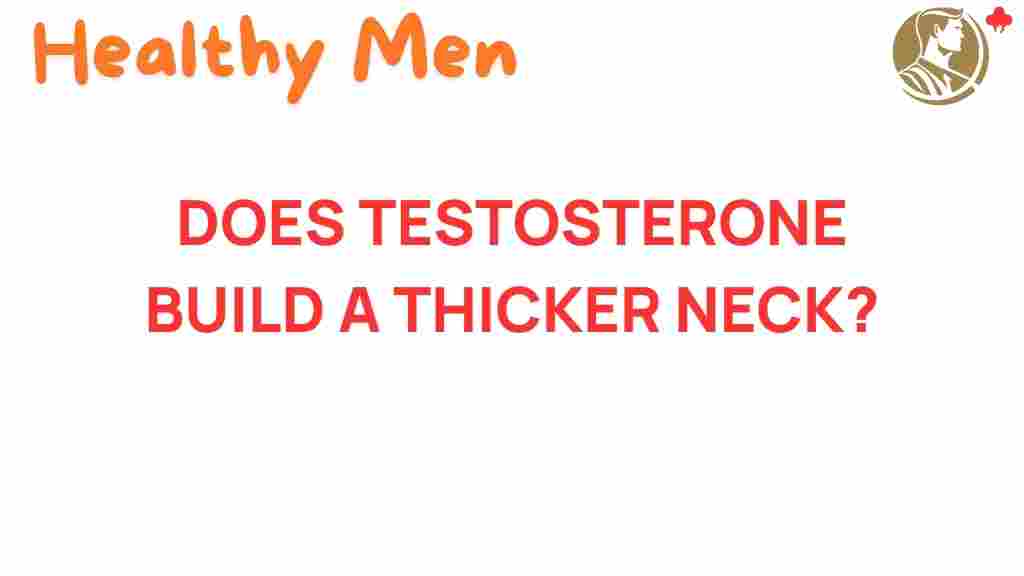Exploring the Connection: Does Testosterone Contribute to a Thicker Neck?
Testosterone is a vital hormone that plays an essential role in various bodily functions, particularly for men. It is well-known for its influence on muscle growth, strength, and overall health. One intriguing aspect of testosterone’s effects is its possible correlation with neck thickness. This article delves into the connection between testosterone and neck thickness, examining how hormones, fitness, and strength training contribute to changes in body composition.
The Role of Testosterone
Testosterone is primarily produced in the testes in men and the ovaries in women, albeit in smaller amounts. This hormone is crucial for:
- Muscle Growth: Testosterone enhances protein synthesis, which is vital for building and repairing muscles.
- Bone Density: It plays a role in maintaining bone density, which is important for overall strength and health.
- Body Composition: Testosterone influences fat distribution and helps in reducing body fat.
- Libido and Sexual Health: It is also linked to sexual desire and performance.
With these functions in mind, it becomes essential to explore whether increased testosterone levels can lead to a thicker neck, which is often associated with overall muscularity and strength.
Understanding Neck Thickness
Neck thickness can be an indicator of muscle growth and strength. It is particularly relevant for athletes and fitness enthusiasts, as a thicker neck is associated with:
- Improved Athletic Performance: A strong neck can enhance stability and power in various sports, from wrestling to football.
- Injury Prevention: A thicker neck can help in absorbing impacts and reducing the risk of injuries, particularly in contact sports.
- Aesthetic Appeal: For many, a thicker neck is a sign of physical strength and fitness.
But how does testosterone factor into this? Let’s explore the link between testosterone and neck thickness in more detail.
How Testosterone Affects Neck Thickness
The relationship between testosterone and neck thickness can be understood through several mechanisms:
1. Muscle Hypertrophy
Testosterone is known to stimulate muscle hypertrophy, which is the increase in muscle size. When combined with strength training, higher testosterone levels can lead to significant gains in muscle mass, including the muscles surrounding the neck.
Strength training exercises that target the neck include:
- Neck bridges
- Weighted neck extensions
- Farmers walks
- Deadlifts
These exercises not only strengthen the neck but also promote overall muscle growth, contributing to a thicker neck over time.
2. Hormonal Balance
Testosterone helps in maintaining a balance between muscle protein synthesis and breakdown. As testosterone levels rise, the body becomes more efficient at building muscle, which can lead to increased neck thickness, especially when combined with a proper fitness regime.
3. Body Composition Changes
Higher testosterone levels are associated with improved body composition. Individuals with elevated testosterone typically have lower body fat percentages, which can make muscles, including those in the neck, appear more pronounced.
4. Recovery and Endurance
Testosterone also plays a role in recovery. Enhanced recovery allows individuals to train more consistently and effectively, leading to better results in muscle growth and strength, including in the neck area.
Step-by-Step Process to Enhance Neck Thickness through Testosterone and Fitness
If you are interested in increasing neck thickness through testosterone and fitness, consider following these steps:
Step 1: Strength Training
Incorporate strength training exercises that target the neck and surrounding muscles. Focus on:
- Compound movements (e.g., squats, deadlifts)
- Exercises specifically for the neck (e.g., resistance bands, neck harness)
Step 2: Optimize Testosterone Levels
To naturally boost testosterone levels, consider implementing the following strategies:
- Regular Exercise: Engage in both strength training and cardiovascular activities.
- Healthy Diet: Consume a balanced diet rich in healthy fats, lean proteins, and whole grains.
- Sleep Quality: Aim for 7-9 hours of quality sleep each night.
- Manage Stress: Practice stress-reducing techniques such as meditation or yoga.
Step 3: Monitor Body Composition
Track your body composition to assess changes in muscle mass and fat percentage. This can help you gauge the effectiveness of your training and dietary strategies.
Step 4: Consider Professional Guidance
If you’re unsure about how to proceed, consider consulting a fitness trainer or a healthcare professional. They can provide personalized advice on strength training and hormonal health.
Troubleshooting Tips
While aiming for a thicker neck through testosterone and fitness, you may encounter some challenges. Here are some troubleshooting tips:
1. Stalled Progress
If you notice that your neck thickness isn’t increasing, consider the following:
- Evaluate your workout routine for variety and intensity.
- Ensure you are progressively overloading your muscles.
- Check your nutrition for adequate protein intake.
2. Hormonal Imbalances
If you suspect low testosterone levels, consult a healthcare professional for testing and potential treatment options. Lifestyle changes can also play a significant role in hormone balance.
3. Injury Prevention
Always prioritize proper form and technique in strength training to avoid injuries. Start with lighter weights and gradually increase as your strength improves.
Conclusion
In conclusion, testosterone does indeed play a significant role in contributing to neck thickness through its effects on muscle growth, hormonal balance, and overall body composition. By engaging in appropriate strength training, optimizing your testosterone levels, and monitoring your progress, you can achieve a thicker neck that complements your fitness goals.
Remember, the journey to a thicker neck and improved athletic performance is not just about increasing testosterone; it’s about maintaining a holistic approach to health and fitness. For more tips on achieving your fitness goals, check out our related articles on muscle building strategies.
For more information on testosterone and its effects on the body, you can visit this resource.
This article is in the category Fitness and created by healthymen Team
